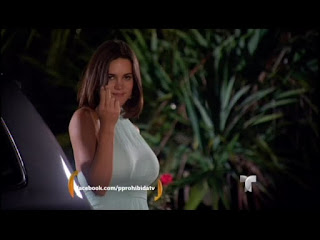It’s hard to remember a telenovela as terrible as Telemundo's LA PATRONA
that became a hit. (Having just suffered through the first 10 episodes of CORAZÓN
INDOMABLE, which is doing very well right now in Mexico, it just might be the year of terrible novelas becoming hits, but the jury is still out on that one - maybe it will get better.)
Back to LA PATRONA. The performances range
from the expectedly awful (Aracely Arámbula – pathetically phony as usual), shockingly inept
(Jorge Luis Pila – he only seems capable of playing “arrogant dickhead”), one
note (Christian Bach – who gives the exact same lilting read to every line and
poses in every scene, arms back to hide the wrinkles on her neck and chest), to
soporific (most of the supporting and younger actors). Gonzalo García Vivanco and Erika de la Rosa
manage some moments of life, but really, only Geraldine Zinat gives a performance
consistently rich and of true feeling.
The plotting is absurdly terrible, rife with
incongruities, faulty logic and holes. Knowing
the villainess played by Christian Bach is a several-time murderer who has done
her and her family immeasurable harm, the heroine nevertheless decides to save
her for last in her vengeance plot, allowing her to kill even more characters.
It is a telenovela brimming with incredibly stupid
characters. In the first 30-40 episodes,
the heroes stupidly fall for every trap set by the villains. The next 50 episodes see the villains fall
for every trap set by the heroine. Now,
the two sides simply alternate their stupidity.
The vengeance plot of the heroine is so vague – it largely consists of her staring at photos of the baddies with
targets drawn on them on a television monitor.
The villains are so evil, they would have killed themselves off without
the intervention of the heroine. The characters waft from event to event aimlessly - there is no psychology, no motivation - whatever is required by the plot at the time is what they do, and they seem to forget events that happened just a few episodes earlier.








